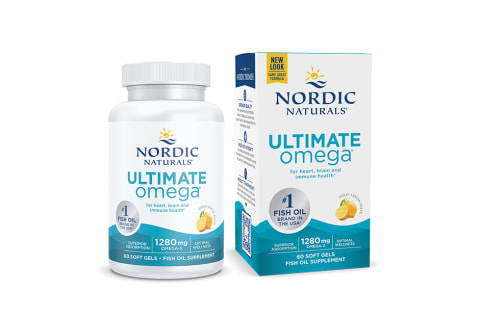Advertisement
Longevity, But Make It Simple With An Omega-3 Supplement

While longevity may be one of the hottest topics in wellness right now, it can feel a bit daunting. We’d all love for someone to just tell us the secret to aging gracefully, but the truth is, there’s no single approach. There is, however, a unique type of healthy fat that all longevity-seekers can benefit from.
Omega-3 fatty acids are often touted for their long list of health benefits. Important parts of the body depend on an ample supply of omega-3s to function optimally––which means they’re critical to longevity. So if you’re looking for a simple way to support your long-term health, an omega-3 supplement, such as Nordic Naturals’ Ultimate Omega, may be a great option.* But let’s dive into this further.
Omega-3s: The CliffsNotes version.
Omega-3 fatty acids fall into a category of long-chain unsaturated fats called polyunsaturated fatty acids (PUFAs). Within this family of omega-3s are three main types––EPA, DHA, and ALA––and each have different biological actions. While your body needs these omega-3s to survive, it can’t make ALA on its own and it can’t make EPA or DHA without ALA. Even if you do consume adequate amounts of ALA, research shows that the conversion rate to EPA and DHA is typically low.
You get EPA and DHA by consuming fish with higher fat content (think salmon, sardines, anchovies, and mackerel), but many find supplementation to be a more convenient approach. Consuming enough omega-3s through diet alone can be daunting, not to mention, you may not enjoy the taste of these health-packed fish. But with a supplement like Nordic Naturals’ Ultimate Omega, made from 100% wild-caught sardines and anchovies, you get 1100 mg of omega-3s EPA and DHA per serving (two softgels).
4 ways omega-3s promote longevity.
It’s clear our bodies aren’t good at producing omega-3s on their own, but the question is why do we need them? AKA how exactly do they help us to live a long and healthy life? Omega-3s serve a variety of important purposes throughout the body, but we’ve rounded up the ones that are particularly relevant for longevity.
1. Heart health
It’s no secret that cardiovascular health becomes increasingly more important as we age––which means so do omega-3s. Research shows that higher concentrations of omega-3s are associated with greater cardiovascular function, including healthy circulation and blood pressure regulation.* EPA and DHA, specifically, are involved in modulating these cardioprotective factors.*
2. Cognitive function
Nurturing your working memory and overall cognition is key to longevity––and as the fattiest organ in the body, our brain depends on fats to perform these functions. According to research, DHA promotes mental acuity and cognitive function; and at certain levels, daily consumption of DHA has even been linked to improved episodic memory in older adults.*

3. Eye health
Just like in the brain, DHA is the most abundant fatty acid found in the eyes. It helps to regenerate rhodopsin, a pigment involved in converting the light to visual images.* Consequently, it’s also crucial for retina development and function––both early in life and as we age. In fact, individuals who consume diets rich in omega-3s are 25-35% less likely to experience age-related vision concerns.*
4. Joint mobility
While physical activity is a good thing, it can take a toll on our joints. That’s where omega-3s come in. Omega-3s help to reduce cellular stress and oversee cell signaling, helping to keep our joints comfortable and healthy.*
The takeaway.
Omega-3s are essential to wellness. More than 80% of Americans are not getting enough omega-3s from their diet.† We get it though: Consuming multiple servings of fish per day is not super realistic. That’s why supplements like Nordic Naturals’ Ultimate Omega are an absolute game-changer. The information surrounding longevity may be overwhelming, but adding omega-3 into your diet is typically a no-brainer––especially when there’s an easy way to do it.
†Nutrient data: Richter CK et al. Lipids. 2017;52(11):917-927.
Other references: Arterburn LM et al. Am J Clin Nutr. 2006;83(6):1467S-1476S. Innes JK et al. Int J Mol Sci. 2020;21(4):1362. Chadda A et al. Circulation. 2015;132(22):e350-e352. Chang CY et al. Acta Neurol Taiwan. 2019;18(4):231-241. Cardoso C et al. Nutr Res Rev. 2016;29(2):281-294. Yurko-Mauro K et al. PLoS One. 2015;10(3):e0120391. Senapati S et al. Biochim Biophys Acta. 2018;1860(6):1403-1413. Gogus U et al. Int J Food Sci Tech. 2010;45(3):417-436. Gammone MA et al. Nutrients. 2019;11(1):46. Heshmati J et al. Pharmacol Res. 2019;149:104462. Murphy RA et al. BMJ Open. 2021.11: e043301.

